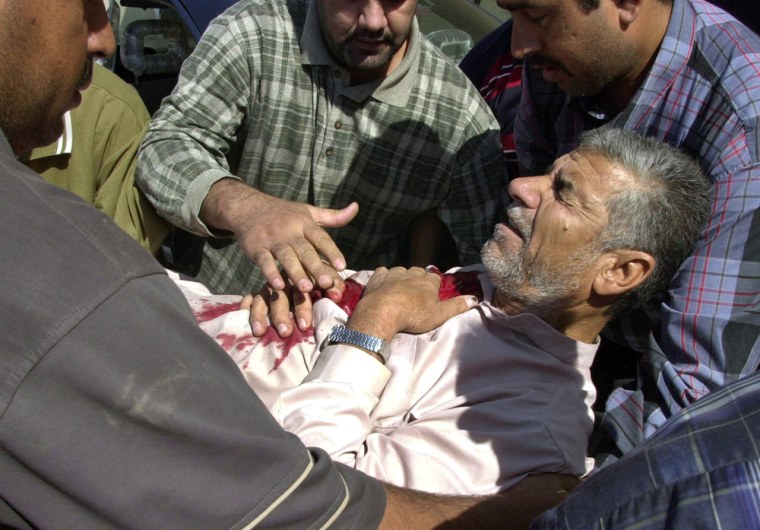U.S.-led forces have recovered a letter they believe was addressed to Jordanian-born militant Abu Musab al-Zarqawi complaining about low morale among his followers and the incompetence of leaders in his terror network, the military said Tuesday.
The letter was seized during an April 28 raid in Baghdad, which also yielded an undated document listing target information and sketch maps for kidnappings and bombings, the statement said.
Meantime, officials said that coalition soldiers fought suspected members of al-Zarqawi's group near a Syrian border town in a battle that killed 12 militants, injured a 6-year-old girl and wounded six coalition soldiers.
The fighting, which included a U.S. air strike, occurred Monday around the town of Qaim, when the coalition forces tracked down and confronted a small group of suspected members of the terrorist group al-Qaida in Iraq, the military said.
Al-Zarqawi has declared his allegiance to Osama bin Laden’s al-Qaida network and has been tied to many bombings and kidnappings since the U.S.-led invasion removed Saddam Hussein from power two years ago.
Battle near Syrian border
Monday’s battle occurred after coalition forces searching an area of suspected insurgents followed a truck to an isolated tent and shed east of Qaim, the U.S. military said in a statement.
There, men from the truck and from inside the tent and shed loaded materials onto the vehicle. the military said. When it began to drive off, coalition forces stopped the truck, and the suspected insurgents — armed with assault rifles and hand grenades — opened fire, the statement said.
In the battle that followed, nine adult male insurgents were killed and one wounded, and the 6-year-old girl received injuries to her head and one leg, the military said.
A U.S. air strike killed three other insurgents and destroyed the tent and shed, the statement said.
Six coalition soldiers — whose nationalities were not released — were wounded and taken to a nearby military medical facility, where they were in stable condition, the statement said. The girl’s injuries were not severe.
Searching the site of the battle, coalition forces found false identification cards, foreign currency and other evidence of direct ties with Zarqawi’s terrorist group and other insurgent groups based outside Iraq, the military said.
Striking back
Also Monday, a car bomb exploded in an upscale shopping district of Baghdad, killing at least six Iraqis and setting fire to an apartment building, in a surge of violence that has left at least 140 people dead since a new government was formed last week.
Striking back at the insurgency, U.S. and Iraqi forces have captured 84 suspects in the Baghdad area since Sunday, the U.S. military said. An additional 52 suspects were captured Monday in a joint operation in the Diyarah area, south of the capital.
The skyrocketing attacks are blamed on an insurgency believed largely made up of members of the disaffected Sunni Arab minority, who dominated Iraq for decades under Saddam Hussein but were mainly shut out of a partial new Cabinet announced Thursday.
Meanwhile, with the new government due to be sworn in on Tuesday, incoming Prime Minister Ibrahim al-Jaafari has filled six of the seven Cabinet seats that were left undecided last week, an aide, Laith Kuba, said Monday. But disputes remained over the key defense ministry portfolio, which is destined for a Sunni.
Al-Jaafari’s initial choice was rejected by members of his Shiite-dominated alliance because of suspected ties to Saddam’s Baath Party, which brutally repressed Kurds and the majority Shiites. Since then, rival Sunni factions have submitted a number of candidates for the job.
